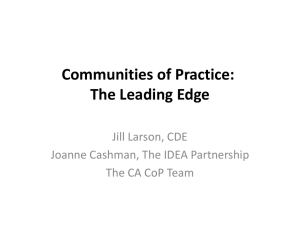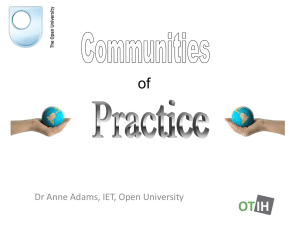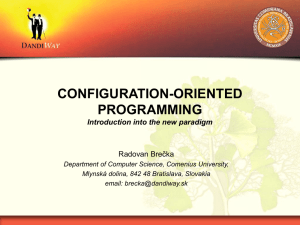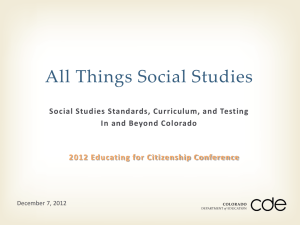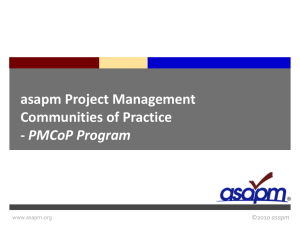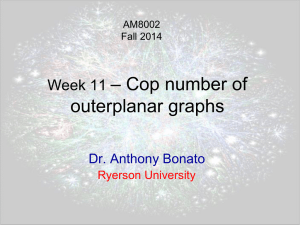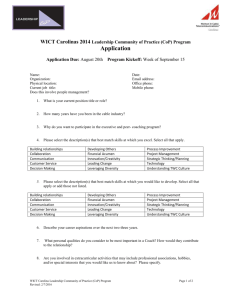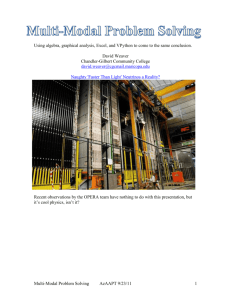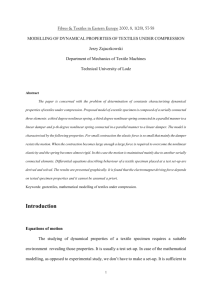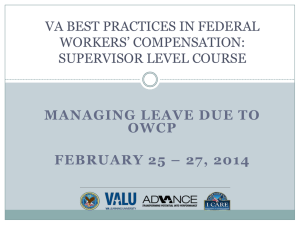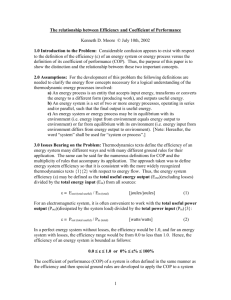Communities of Practice
advertisement
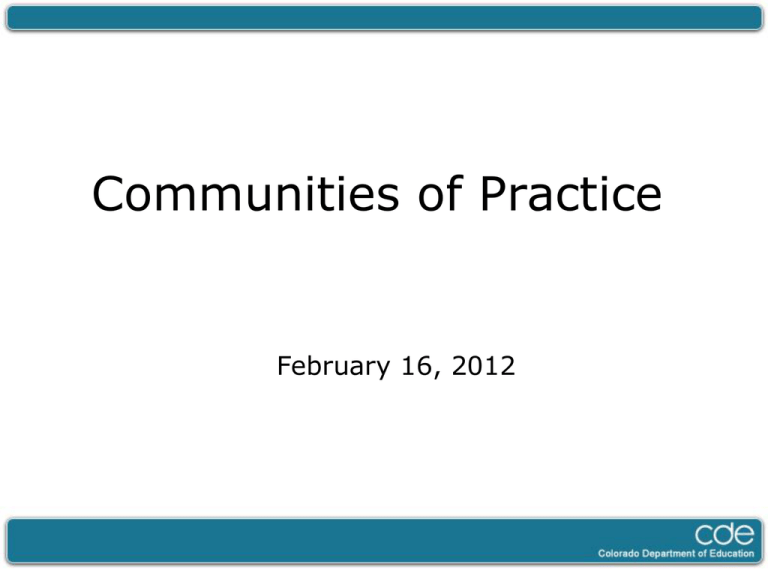
Communities of Practice February 16, 2012 Community of Practice: What is it? • A group of people who engage in a process of collective learning. • “CoPs are a group of people who share a concern or a passion for something they do and learn how to do it better as they interact regularly.” Wenger • Website: http://www.ewenger.com/theory/inde x.htm IDEA Partnership: Another View of COP • www.ideaparternship.org • A Community of Practice (CoP) is quite simply a group of people that agree to interact regularly to solve a persistent problem or improve practice in an area that is important to them. • A New Approach to Solving Complex Educational Problems – Cashman, J., Linehan, P., & Rosser, M. (2007). Communities of Practice: A new approach to solving complex educational problems. Alexandria, VA: National Association of State Directors of Special Education. – http://www.ideapartnership.org/documents/CoPGuide.pdf Community of Practice: Comparisons Distinctions Between Communities of Practice and Other Structures Structure What’s the Purpose Who Belongs? How Clear are the Boundaries? What Holds them Together? How Long Do They Last? Communities of Practice To create, expand and Self-selection based on exchange knowledge, and expertise or passion for a to develop individual topic capabilities. Fuzzy Passion, commitment and Evolve and end identification with the organically (last as long as group and its expertise. there is relevance to the topic and value and interest in learning together). Formal Departments To deliver a product or service Everyone who reports to the group’s manager Clear Job requirements and common goals Intended to be permanent (but last until the next reorganization). Operational Teams To take care of an ongoing operational process Membership assigned by management. Clear Share responsibility for the operation Intended to be ongoing (but last as long as the operation is needed. Project Teams (taskforces) To accomplish a specified task People who have a direct role in accomplishing the task Clear The project’s goals and milestones. Predetermined ending (when the project has been completed Communities of Interest (PLC’s) To be informed Whoever is interested Fuzzy Access to information and sense of like mindedness Evolve and end organically Informal Networks (Blogs, twitter) To receive and pass on information, to know who is who. Friends and business acquaintances, friends of friends Undefined Mutual need and relationships Never really start or end (exist as long as people keep In touch or Cultivating Communities of Practice: A Guide to Managing Knowledge. By Etienne Wenger, Richard McDermott, and William Snyder, Harvard Business School Press, 2002 Community of Practice: CoP Agenda Possibilities • Discussion on identified priorities • Creation of information repository • Identify new practices and provide feedback for improvement • Emphasis on sharing knowledge and expertise on issues related to a specific domain Communities of Practice in Colorado CoPs in CO • Funded by the State Personnel Development Grant (SPDG), a grant from the Office of Special Education Programs (OSEP) • Supported through a partnership with National Association of School Psychologists (NASP) and IDEA Partnership with additional support from the RtI Action Network Other CoPs in Colorado supported by CDE • Family School Partnering CoP • Early Childhood Education CoP of Coaching (CoPCo) • North Central Colorado RtI CoP Family School Partnering CoP Goal: To increase the intentional implementation of effective familyschool partnering practices within the RtI/PBIS framework in order to improve academic, social, emotional, and behavioral outcomes for all students FSP CoP Actionable Solutions: (Established by the CoP) • Families and schools share knowledge and language. • Schools create positive and welcoming environments for all families. • Families and schools build positive foundational relationships. FSP CoP CoP Partners: • CDE • Colorado Parent Information Resource Center (CPIRC) • Denver Metro Community Parent Resource Center • PEAK Colorado Parent Training and Information Center Is comprised of family members, CDE representatives, school personnel, and community members FSP CoP • Currently have 15 consistent members and are considering expanding the group • Began meeting in September • Meet face-to-face every 2-3 months and have virtual meetings the other months • Currently use Blackboard as an online repository and are exploring the option of Sharedwork.org Early Childhood Education Coaching (CoPCo) Goal: To support best practices for coaching in early childhood classrooms that serve children with special needs. Coaching is a proven strategy that supports teachers to implement and sustain evidencebased practices which leads to improved outcomes for children. CoPCo • Is comprised of early childhood coaches working in preschool settings in which children with disabilities participate • Is led by two CDE consultants who provide coaching training around the state through CDE’s preschool special education office. CoPCo • Will hold two face-to-face meetings between January and June 2012; participate twice a month in an online blog (weebly.com); join in on two conference calls during the year • Held their first meeting the end of January • Currently, about 20 people are a part of the community North Central Colorado RtI CoP • Goal: To improve outcomes for students through implementation of RtI. • Stemmed from an expressed need to learn from others who are implementing RtI • Will have their first meeting next week • Will include district and building leadership, practitioners, former RtI Cadre members • CDE will support but not lead the group Successes and Challenges of Colorado CoPs Successes • Strong sense of community • Shared passion about a common purpose • Unique topics allow for connections among those who often work without a support network • • • • • Challenges Finding ways to impact the field Going beyond discussion to action Just getting started Shifting ownership from a core group to everyone Keeping the momentum between face-to-face meetings CoP Survey Please complete the survey to provide feedback. Your input counts!
